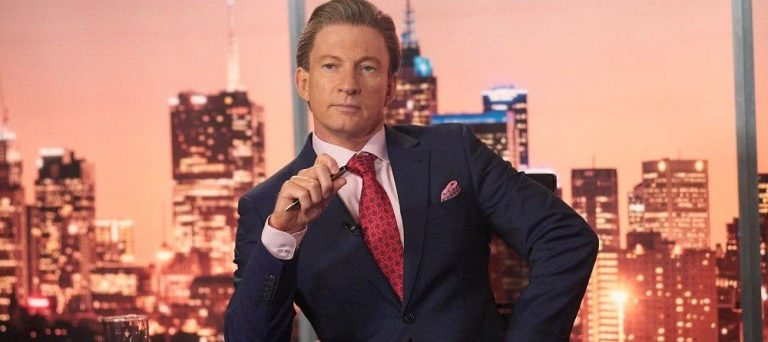If nothing else, 2017 has proven that time is a flat circle, and history inevitably repeats itself in new forms ad infinitum. Naturally, life imitates art in this respect, and while we have welcomed the return of old stories like Wake In Fright, Wolf Creek, Fargo and Twin Peaks, less welcome but equally familiar guests have joined these successes on our screens.
This year, we’ve watched as swastika-clad men have paraded through city streets; as fascistic sentiments have bubbled over into public debate; as alt-right provocateurs have sold hatred to adoring fans; and as populist leaders have given no condemnation whatsoever of the white supremacy or misogyny unfurling around the world. Not one of these events was scripted – all played out live through 24 hour news broadcasts.
Every member of the crew of Stan original series Romper Stomper was deeply, uncomfortably aware of this duality as they worked on bringing writer/director Geoffrey Wright’s controversial masterpiece roaring into the 21st century.
They’re not clichés, these people.
“Solutions only come about slowly, over a long period of time, so there’s no quick fixes to anything,” says Wright, the director of the first two episodes of the series. “To any complex problem, there are only complex solutions, and this in itself is a philosophical position relevant to the story, because what extremists tell you is that you can have short, sharp, quick solutions to problems – and I don’t believe that’s the case. It’s fear that drives people into extreme politics, in my opinion, and I’ve always thought this, even back in the original film.”
Wright’s new extremists take a form antithetical to that of the original film’s Hando and his thuggish gang of Nazi punks – led by blokey, charismatic Blake, the new right are envisioned as, well, the picture of the Australian Dream. They own splashy suburban houses, contribute to their communities, and loudly protest any perceived threat to their neighbourhood’s cultural makeup. The efforts of Patriot Blue begin with loudspeakers, but escalate rapidly to violence.
“They’re not clichés, these people,” says actor Lily Sullivan, whose anti-fascist activist character Petra sees Blake and his ilk as the enemy. “They’re quite well off, quite well educated, some of them; it’s alarming that they have these views. Romper Stomper is shining a light on these people with these prejudiced views that are living in middle-class suburbia; who have these beautiful homes.”
It may sound as if the series is merely giving a platform to hateful rhetoric, but Wright is no stranger to this strain of criticism. “People used to complain about the old film that you’re highlighting these characters too much, you’re glorifying them,” he says, “but to me that makes no more sense than saying Richard III is a glorification of child murder. This is a story with some villainous people in it, but different shades of villainy, and villainy that’s been arrived at for all sorts of different reasons.”
We’ve ended up with Trump and Brexit and One Nation holding the balance of the power.
More diplomatic in his approach, co-producer Dan Edwards believes that crafting the series is all about maintaining balance. With three factions vying for screen time – Blake’s Patriot Blue, the leftist cell “Anti-Fash” and a Lebanese-Australian family caught in the middle – no one political ideology can be dominant.
“As much as you may despise some of these characters, or side with one more than the other you’ve got to give them all their time in the sun,” says Edwards. “This was a show that really needed to dig into some of that alt-right ideology … which can be within your neighbourhood. We try to give everyone the opportunity to state their case, and that’s probably what makes it an uneasy watch.
“I think it’ll definitely generate discussion, because we’re not overtly taking sides. I think clearly as you see more episodes, [there’s] a more sinister story arc. But we really try to give all sides plenty of oxygen.”
The reluctance is natural – none of us on the left side of politics want to admit that Nazism is alive and well, or that leftist extremists can be equally vicious. But the conversation has never been more important, as the cast and crew themselves discovered while embroiled in production.
“Events have overtaken us, in a way,” says Edwards. “I think that we’ve ended up with Trump and Brexit and One Nation holding the balance of the power without any [television drama] like this that focuses on fascism or extremism in general, and so in that sense I think it’s kinda risky but it feels like the right thing to do.
“Kinda shockingly, Charlottesville happened the week after we shot a very similar scene in St Kilda,” he says. “The actors actually found that quite confronting.”
Sullivan remembers the day vividly. “With Charlottesville, life was already imitating the things we were making and trying to explore, so that was kind of intense … to feel actually in sync with the news,” she says. “It was such an intense energy, and that’s when storytelling feels profound; it feels like you’re actually contributing to the world. You feel present.”
Though shaken by how closely they’d (unknowingly) hewed to reality, the events in Charlottesville only served to bolster the resolve of the creatives. A vocal opponent of political correctness, Wright seized the opportunity to shine a spotlight on our country’s own bubbling pits of unrest.
“There’s been this feeling of, ‘Let’s not show these people because if we just refuse to depict them, they will go away’. But I think the opposite is true,” Wright says. “They actually thrive. They enjoy not being understood; they enjoy being these kind of spooky figures in the shadows … Let’s talk about everything, and you guys and you girls from these extreme ends, come forward and tell us exactly what it is you are afraid of because this kind of hatred and this kind of activity is the result of fear.”
Wright and Edwards are of a mind on this matter. “As much as I find some of these people really quite disgusting and vile, they are human.” Edwards says. “The staunch opposition to those views was so mainstream and absolute that all of a sudden, it snuck up on us and therefore a disenfranchised part of society has now gained traction by bringing this stuff into the center rather than onto the fringe where it was even only 15 years ago. I think having those politics out in the open is better than pushing it to the side and completely disregarding it. That has not worked.”
This is where the possibilities of pan-generational storytelling really shine. Just as Twin Peaks brought back many of its surviving cast members, Romper Stomper has plenty of familiar faces plucked from the 1992 classic. But more importantly, the production has united artists separated by decades under the banner of change.
“With the state of the world today, it’s really exciting to be a part of something that isn’t just adding to the infinite amounts of escapism that we have and options to escape the realities; to be a part of a production that is confronting and provocative and thought provoking,” says Sullivan. “I think everyone needs to sit in the ugly for a while in order to make a better world.”
Romper Stomper hits Stan on Monday January 1.


































